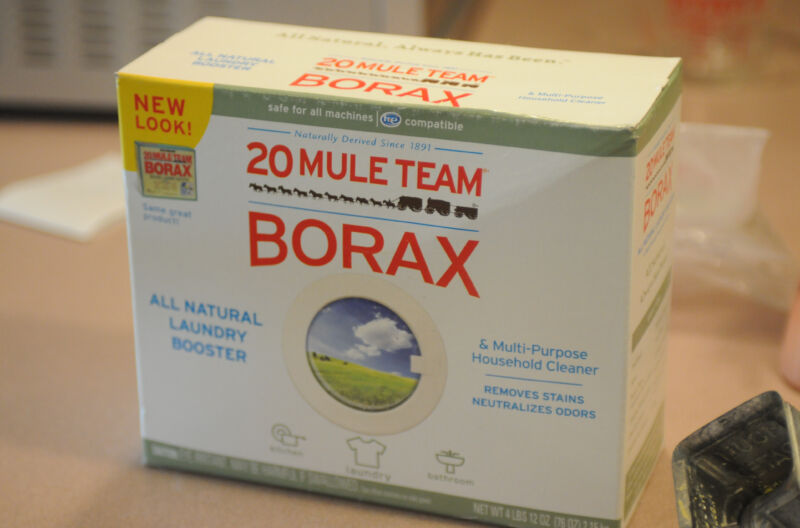In the latest health fad to alarm and exasperate medical experts, people on TikTok have cheerily "hopped on the borax train" and are drinking and soaking in the toxic cleaning product based on false claims that it can reduce inflammation, treat arthritis, and "detoxify" the body.
The troubling trend harkens back to both the Tide Pod Challenge trend of 2018, in which teens chomped down on detergent packets on camera, and the infamous "Church of Bleach," a faux religious organization that sold industrial beach as a "miracle" solution that could cure a variety of serious diseases when ingested. (The family was recently found guilty of fraud and now awaits sentencing.)
Like the bogus trends that came before them, the new borax enthusiasts have drawn on well-worn conspiracy theories and dubious data to support their poisonous practice. In one video, a TikTok user explained that she put borax in her smoothies because "they are spraying us with chemtrails." Others have suggested borax's unproven health benefits are being purposefully stifled by Big Pharma in a conspiracy to keep people paying for more expensive (and regulated) pharmaceutical products—a common refrain among people peddling unproven health and wellness products.
Meanwhile, the borax trend has hit the radar of poison control centers and toxicology experts. In a debunking article from the National Capital Poison Center, the organization outlined a case of one man who had to go to the emergency department days after soaking in a borax bath, which caused severe skin irritation, swelling, and dryness.
And that's not the worst of it. According to the National Institute of Health's Office of Dietary Supplements, ingesting borax or the related boric acid can cause nausea, gastrointestinal discomfort, vomiting, diarrhea, skin flushing, rash, excitation, convulsions, depression, and vascular collapse.
A report from 1973 outlined the cases of two infants who developed chronic borate intoxication after their mothers repeatedly dipped their pacifiers in a honey-borax solution, thinking the borax was a safe antiseptic (it isn't). After weeks, the infants started having seizures and developed anemia. The study's authors blamed the harm on the "negligence" of the companies selling the mixture, noting that the mixture's packaging did not warn that it "is really a poison."
No benefit, all risk
These days, borax—sodium tetraborate decahydrate—is mainly found in laundry detergents, where it acts as a bleaching agent. It's also used for industrial glass production and, in small amounts, can be combined with glue to form slime that children can play with—without eating.
Some of the TikTokers advocating for drinking or bathing in borax note that it contains boron, which is a naturally occurring trace element readily found in common foods, such as fruits, peanuts, legumes, potatoes, and milk. It's (of course) also found in dietary supplements. But, boron is not considered an essential nutrient for humans, and researchers have not identified a clear biological function for the element. There is some preliminary data suggesting that boron may be important for bone growth and that it could help reduce the symptoms of osteoarthritis, possibly by inhibiting inflammation. There are also hints that it may influence some cancer risks. But no clinical trials have evaluated any of those possible health benefits.
And, importantly, borax is not the same as elemental boron. Borax is toxic, with short-term use leading to irritation, nausea, vomiting, and diarrhea. (The poison center notes that eating borax can turn your vomit and stool a blue-green colour.) And, as the report on the two infants highlights, long-term use leads to seizures and anemia.
There's little evidence that the cleaning product can reduce inflammation, despite the false claims on TikTok. Some proponents may note two Turkish studies in rats that suggest borax reduced inflammation from human cancer drugs and spinal cord injuries. But the studies tested borax in groups of just eight and seven rats, respectively, and even larger studies do not support the use of borax in humans.
With the dearth of data indicating benefits in humans, the poison center sums things up succinctly: "Borax is not intended for human consumption, and may cause toxic effects when swallowed, inhaled, or applied to the skin."



3175x175(CURRENT).thumb.jpg.b05acc060982b36f5891ba728e6d953c.jpg)

Recommended Comments
Join the conversation
You can post now and register later. If you have an account, sign in now to post with your account.
Note: Your post will require moderator approval before it will be visible.